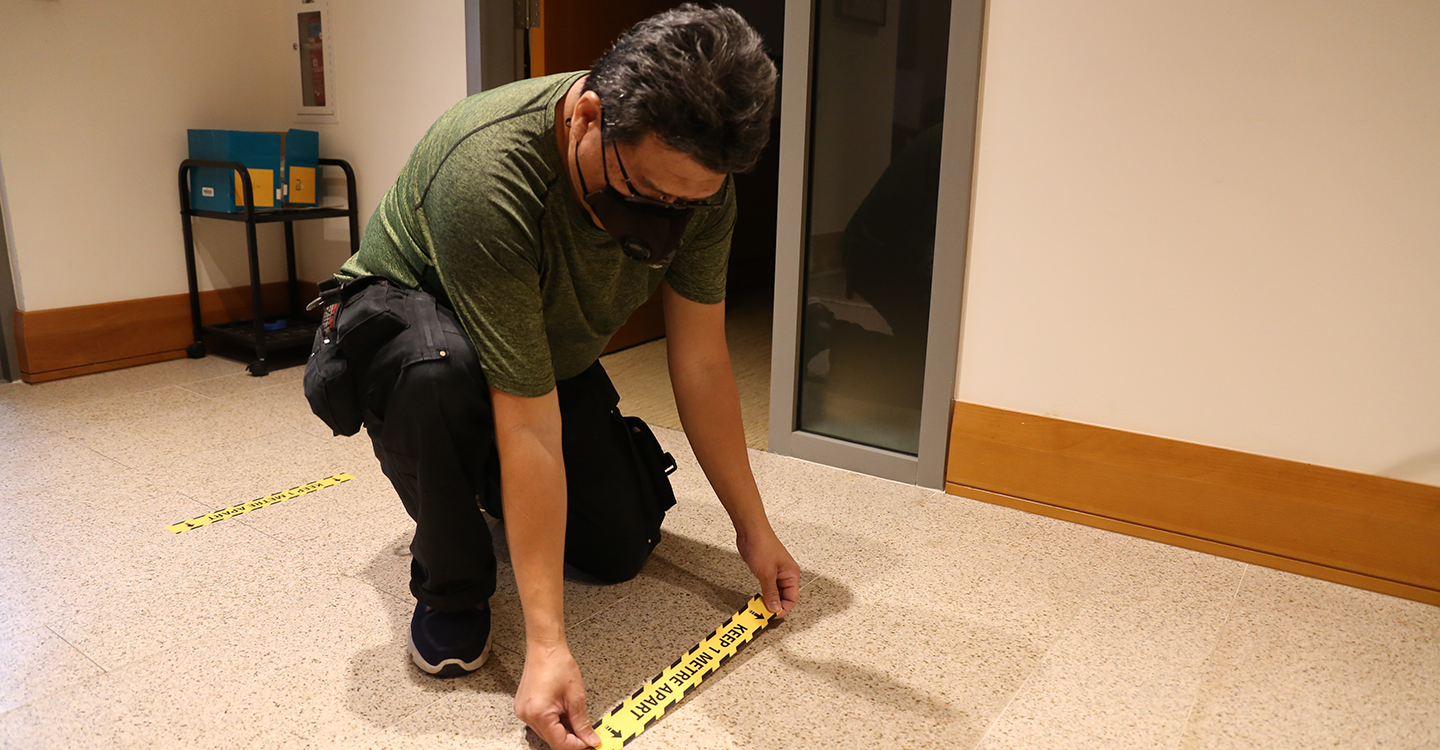Keeping Yale-NUS spaces safe amidst a pandemic
As the new school term begins in August, many departments in Yale-NUS College have been working around the clock to ensure that staff, faculty, and students are welcomed back into a safe environment. The Office of Infrastructure, Safety and Security, the Library, and the Dining Experience Team (DXT) have been putting precautionary measures in place to ensure that the community remains well-supported.
As the COVID-19 situation evolves, College has had to keep pace with directives from government agencies and the National University of Singapore. “We have had to constantly evolve our response to the challenges brought on by the pandemic,” noted Ms Priyanka Sharma, Principal Librarian at Yale-NUS.
 Ms Priyanka Sharma at a Yale-NUS Library exhibition. Image provided by Priyanka Sharma.
Ms Priyanka Sharma at a Yale-NUS Library exhibition. Image provided by Priyanka Sharma.
“It has been a challenging experience having to constantly adapt to ever-changing protocols and regulations,” added Mr Muhammad Erfaan, Residential Housing Operations Executive and Ms Natalie Ang, Wellness Manager, both part of the Dean of Students Office (DOS) at Yale-NUS. The duo co-lead Yale-NUS’ Dining Experience Team, managed by DOS, which oversees the College’s three dining halls.
Yale-NUS has been making every effort to ensure that safe distancing and proper hygiene practices are observed on campus.
The Library, for instance, is open for faculty, staff, and students. However, external visitors are not allowed to enter, and alternate library seats have been cordoned off since March to prevent close contact between users. As an extra precaution, library materials are also quarantined for 72 hours upon return.
Where applicable, in-person library services have been moved online as well. The Library is now holding its information literacy and research skills workshops via teleconference. Reference and research consultations are also being conducted remotely.
“The Library is very proud of the fact that we have been able to provide a near-full library service experience,” said Ms Sharma.
Meanwhile, the Office of Infrastructure, Safety and Security has outfitted all classrooms with safe distancing markers and usage guidelines. It has assisted the Centre for Teaching and Learning to organise classroom visits for faculty members before lessons officially start, to walk them through the updated safety provisions for the semester.
 Anthony Wong, Specialist Associate, Building & Facilities Management, Office of Infrastructure, Safety and Security, places a safe distancing marker. Image provided by Yeap Yi Yi.
Anthony Wong, Specialist Associate, Building & Facilities Management, Office of Infrastructure, Safety and Security, places a safe distancing marker. Image provided by Yeap Yi Yi.
Additionally, the Office has distributed face shields, thermometer tool kits and cleaning aids for departments in the College that interact with external visitors. It has also stepped up the frequency of cleaning and inspections in common areas, and have switched to using disinfectant instead of general cleaning solutions to ensure better protection. Teaching facilities, offices and high touch surfaces like lift buttons and grab bars have been treated with hospital-grade antimicrobial agent to neutralise mould, bacteria and viruses on contact.
The College is trying to keep on-campus services running as close to normal as possible. The Office of Infrastructure, Safety and Security has worked out an arrangement with DOS for students to continue booking empty classrooms for self-study, just like in earlier semesters before COVID-19. On top of regular cleaning by housekeepers, the classrooms are equipped with disinfectant wipes for students to carry out a wipe-down after every session.
Unfortunately, safe distancing guidelines will inevitably change how some school spaces are used. To prevent overcrowding at any one dining hall, the College’s vegetarian-only options for Tuesday and Thursday lunches — previously available exclusively at Elm dining hall — will be suspended for the semester. “Rest assured though, there will be sufficient plant-based options available for each meal across all three dining halls,” the DXT team said.
At dining halls, seating capacity will be nearly halved to enable safe distancing. The halls will be split into sections, and Sodexo staff will guide students to an appropriate section upon entry to prevent potential crowding. While students may dine together in groups of up to five, they will be advised to cap their mealtimes at 30 minutes to free up space for other diners.
“Students have to expect a largely different dining experience for the upcoming semester,” said Mr Erfaan and Ms Ang. “The dining halls, which have traditionally been used as a social space, will become more functional.”
Students can also take away food from dining halls for consumption in their rooms, should they wish to minimise interaction with other diners.
 Ms Natalie Ang and Mr Muhammad Erfaan. Images by Yale-NUS College.
Ms Natalie Ang and Mr Muhammad Erfaan. Images by Yale-NUS College.
The journey to reducing COVID-19 risks on campus has not been easy, but the various working groups stand ready to support students as they enter into a new semester.
“Everyone’s safety and well-being are of paramount importance,” said Mr Erfaan and Ms Ang. “The Dean of Students’ Office will continue to work towards a smooth transition to the start of a unique semester ahead.”
“Implementing all of these measures on short notice has been a challenge, but I am very thankful to my team for all their hard work over the past weeks,” concluded Mr Dennis Aw, Director of the Office of Infrastructure, Safety and Security. “We trust that the measures put in place will safeguard the health and safety of our community as the new semester begins.”





